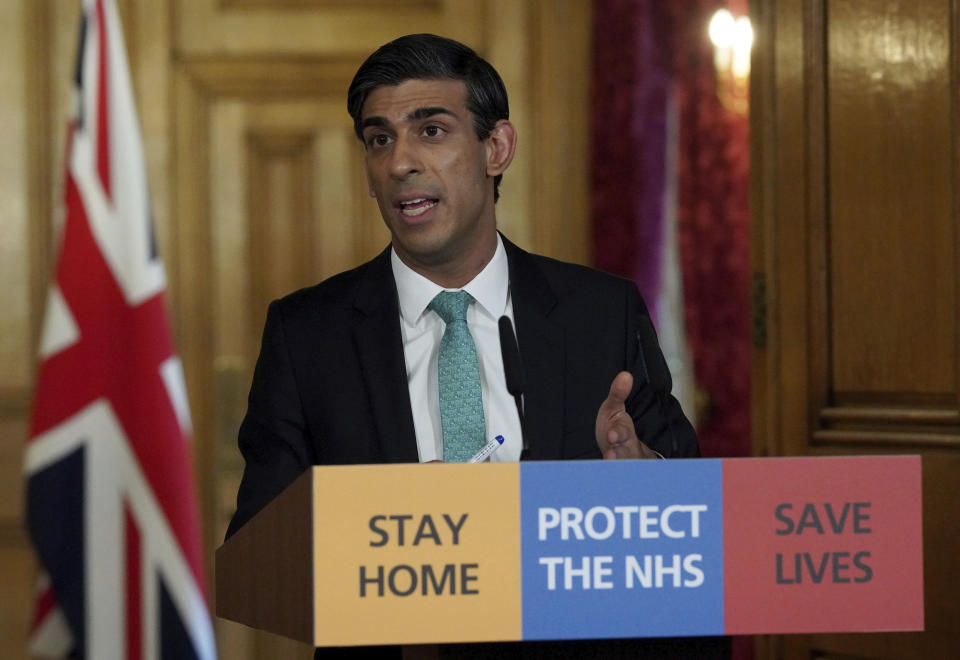Government urged to extend CBILS as fintech lender raises £100m

A top fintech is urging the government to extend COVID-19 support schemes for businesses, warning that many companies will struggle to borrow money once schemes end in the autumn.
Iwoca chief executive Christoph Rieche said it would be “very wrong” to close the government’s coronavirus business interruption loan scheme (CBILS) in September, as currently planned.
“Do small businesses need further support in accessing funding after September? The short answer is absolutely,” Rieche told Yahoo Finance UK.
“Who believes that you can go back after the extent of this crisis to just normal commercial lending? You continue to need the support of reducing the potential downside risk of lenders. There’s going to be most likely some continued disruption, which as a commercial lender you’re very concerned about.”
READ MORE: Storm clouds gather as Europe's banks set aside £30bn for COVID-19
Chancellor Rishi Sunak announced the CBILS scheme in March, part of an “unprecedented” package of support for businesses worth £330bn. The government agreed to guarantee 80% of all CBILS loans extended by banks and lenders. Sunak launched the follow-up Bounce Back Loan scheme in May, offering 100% guarantee on smaller loans for businesses.
Close to £50bn ($65.6bn) has been lent to businesses under government-backed lending programmes since the pandemic began. The British Business Bank, which runs the programmes, is due to wind up the CBIL schemes by 30 September. CBILS can be extended at the British Business Bank’s “discretion,” according to scheme documents, but so far no announcement has been made.

Rieche said lending to small businesses would “probably fall off a cliff” after government guarantees are withdrawn.
“I think it would be very wrong to close the schemes and not extend them for another few months until more certainty comes back on how the winter and fall evolves,” he said.
The comments came as Iwoca announced it had raised £100m from undisclosed investors to lend out under the CBILS. Iwoca is an online business lender that sources capital through wholesale markets to then lend out.
Rieche is calling on banks to partner with fintechs like his to help get cash to as many small businesses as possible before the CBILS ends.
READ MORE: Monzo faces 'pivotal' year with future in doubt as losses mount
“Lets as an industry really work together, banks and fintechs, to serve small businesses in this really precarious situation,” he said.
Over the weekend Iwoca wrote to the CEOs of seven major banks taking part in CBILS, urging them to pass on applications waiting to be processed to Iwoca. Banks are sitting on a backlog of almost 60,000 applications for CBILS support, according to figures from the Treasury.
“All of the flow is going to the banks and they’re not set up to deal with tens of thousands of demands in a month,” Rieche said.
Founded in 2011, Iwoca has lent over £1bn to more than 50,000 businesses since it started. The company uses technology to streamline loan applications and processing.
Iwoca was accredited as a CBILS lender in May but has only lent a small amount through the scheme up till now.
“These processes take time,” Rieche said, referencing raising funds for the scheme. “These are not venture capital investors that are having a high degree of risk appetite. Here we’re speaking about a relatively low fixed income return and these investors, the key thing with which they are tasked is to make sure they are mitigating all downside risks.”
READ MORE: Tide faces customer backlash over Bounce Back loans
Many fintechs have struggled to access funding to take part in government support schemes or seen their own lending business squeezed by cheap government loans, which undercut their margins. Tide, a startup business bank, was forced to withdraw from the Bounce Back loan programme after failing to secure cash.
Rieche said raising cash for Bounce Back loans was “mission impossible” because of their low interest rates. He said there as “decent demand in the market from institutional real-money investors” to fund CBILS, which carry a higher interest rate.
Iwoca has raised equity funding in recent months and was break even last year, leaving it in a strong capital position to withstand the crisis, Rieche said.
“From where we’re standing, we are in the best possible position today.”

 Yahoo News
Yahoo News 
